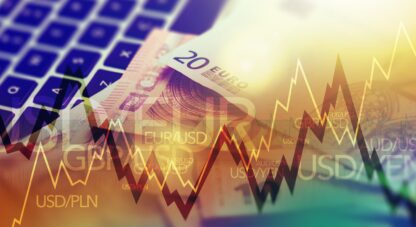Podcast: Play in new window
- China Devouring Gold While FOMO West Gambles Stocks
- Will Political Gaming In US Threaten The Camp David Accord?
- FED’s Super Core Inflation Tops 10% If Annualized
“If you know what the future holds, and you’re happy about it, then everybody goes about it. And actually that’s the context where people start taking more and more risk. Leverage increases and credit flows. Everybody’s happy and asset prices appreciate. But when you can’t see the future—and it can be blocked from your vision by any number of things. Geopolitics is one of those things that, just like the 8,000 pound gorilla, gets your attention. Uncertainties emerge that monetary policy can’t touch.” –David McAlvany
Kevin: Welcome to the McAlvany Weekly Commentary. I’m Kevin Orrick, along with David McAlvany.
It’s funny, being a political year, they want to tell us that inflation’s under control. I don’t think that’s actually the case.
David: Well, I mean it is under control kind of, sort of.
Kevin: You mean under out of control.
David: Yeah. Last week was fun to be an observer. Days go by when a lot happens, but virtually nothing registers as a risk. And so last week we did have the inflation numbers that were very much disturbing, and not the headline CPI so much. That was only off by 1/10th of 1% from the expectations that were there. But the Fed supercore, which sits as the preferred measure next to PCE—those two are the preferred measures, supercore rose at a rate that if you annualized it would have inflation at 10.67%.
Kevin: I have to love how they have their preferred rates and they always prefer the one that tells the story that they want to tell. Now the preferred rate, the supercore annualized 10.67%. How come that wasn’t in the news?
David: It’s inconvenient. We don’t have to annualize, but when you look at the month on month change, which was 0.849, I think annualizing it does take on sort of the gravity and severity of what occurred in a short timeframe. So markets reacted with surprise, and a part of it is because inflation was assumed to be a vanquished foe.
Kevin: Yeah, it’s interesting that the markets do act in surprise. The efficient market theory says that all the information is priced into the market already. Most people who are proponents of that don’t really realize that that would mean that the market would pretty much be flat all the time. But the markets are surprised, and it was the little guys that got hurt, didn’t they?
David: Certainly had more volatility in the small cap stocks and in a few tech names. But if you look at the risk indicators, which we do every day on the wealth management team, the risk indicators remained flat. So the credit market stress gauges largely brushed it off. So your CDS pricing remained near a two-year low. Your bank CDS, this is credit default swaps, barely budged.
And that aspect of it was curious. Doug’s suggestion offers, I think, some insight into perhaps why that’s the case. He said, “I understand why a bond market focused on equity bubble fragility and vulnerable global bubbles would dismiss inflation risk. It became clearer this week that powerful inflationary biases will be hard at work so long as financial conditions remain loose.”
Kevin: One of the tough things about investing, though, Dave, is you can see something coming in the future and it’s not going to price itself in because of time. And I even think about this with inflation, we can say, “Well gosh, inflation hasn’t gone anywhere.” But for the season that we’re in right now, it’s not playing out the way it will completely in the future.
David: Yeah. Fascinating that we have looser financial conditions today than we did prior to the beginning of the hiking cycle.
Kevin: Yeah. When we were near zero rates.
David: That’s right. And we today have looser financial conditions with rates four to 5% higher, and that’s the nature of the market. We have sort of a feeding frenzy on risk, and that feeds back in on itself. So changes in credit default swap prices—that often reflects a tightening of financial conditions. And the current market backdrop is as loose as you can get. The market has moved on from its concerns over inflation—or I guess it would like to move on from those concerns. But as we’ve said repeatedly, inflation, once it’s present, it has sort of an ebb and a flow to it. Like a tide that rolls in and then rolls out. It usually returns again, there’s a surge, and I think the real surge is 2025. I think if I were to peg a timeframe, that would be it. What we have now may be just statistical noise. We’ll have to see.
Kevin: Well, and the 1970s have been a great example of that because you had an ebb and flow of inflation. Now it didn’t go away, it’s just the increase of inflation went away. It was still inflation, let’s say.
David: Yeah. We have yet to see the real impact of energy on that second surge. And so that’s why I would sort of push off and say energy’s coming back, and so is a more frightening version of inflation.
Kevin: Isn’t it like an amplifier? I’ve been studying my ham radio stuff again, and the way an amplifier works is it just continues to feed on itself. And sometimes that actually turns into what we call feedback.
David: Yeah, exactly. So what’s clear is that loose financial conditions have fed on themselves, have created a self-reinforcing upward momentum, that is, in financial assets. And most of the energy that we see in the markets today was infused in December when the Powell Dovish pivot occurred, and this notion that inflation is behind us will be lowering rates quickly—or soon, soon enough. And inflation not being dead yet puts that momentum-driven move at risk. In its place, what we have is the possibility for the Fed to play with this notion of higher for longer. And that’s depressing to many a market speculator, particularly those that confuse leveraged betting with investment. They love the story of easy money’s quick return. In fact, it’s one of the things that they require.
Kevin: I remember when I was a toy store manager, Dave, and this is before I had taken much in the way of economics, I saved and saved to maybe bet in the market, and someone showed me this thing called an option, and it’s like, “Wait, you’re kidding. I can double, triple, quadruple my money with just putting a little bit in.” And the question was, how much can I lose? Well, you can only lose what you invest. That’s what an option is because it expires.
Well, the first option I bought, I can’t remember what it was on. It was on sugar or something like that. Well, within a couple of days I doubled my money. It’s like, “Why in the world am I a toy store manager? This is so easy.” So I reinvested the money and I think it was copper, and of course that option expired. But I mean this reminds me of a lot of the betting sites that we’re seeing now for football. Everybody’s out there just betting options, and it’s not real investing.
David: My first experience with gambling was at a conference with my dad. I snuck away from the conference. This was in San Jose, Costa Rica, and 12 years old, and I disappeared to the casino downstairs. And I took 20 bucks, and in less than, I’d say 60 seconds—in less than 60 seconds—
Kevin: It was gone.
David: —I had lost my 20 bucks. And it cured me of gambling forever. And I realized that when you engage with markets, there is a degree of speculation because you do not know the future, and you only have so many data points to come to what amounts to an educated guess. So there is a speculative bent towards whether you’re going to own Treasurys or own CDs or own gold or own tech stocks, everything’s a speculation.
Kevin: But option’s just an option to buy something.
David: Yeah, I think what we’re talking about is the gambling aspect—
Kevin: Exactly.
David: —where it’s less of an educated guess and it’s more of just a guess.
Kevin: Let’s just see if it works. So, yeah.
David: It’s hard to ignore the scale of the options market. Just this last week, $2.4 trillion in February options expired on Friday. That’s T as in taco, as in Titanic, T as in trillion. And it appears that gambling, more than investment, has become the current market preference. Loose financial conditions promote that. They promote risk-taking on an amplified basis. Risk taking is pushing the boundaries of scale and scope into all sorts of different kinds of assets. Doug may be right that the bond market is sussing out and looking ahead to an unhappy ending, an explosion in risk-taking going awry.
Kevin: Well, we just had the Super Bowl this week and it’s just been amazing to me, Dave, this last year or two, how many gambling sites online are gearing towards sports and football? I don’t think it’s necessarily healthy, but it certainly seems to signal a market top in many areas.
David: It was only a year ago, the previous Super Bowl, that we had a star-studded cast of people who were out there to advertise for cryptocurrencies.
Kevin: Exactly. Some of them that don’t even exist anymore.
David: Don’t exist anymore. So it’s worth considering these authorities—quote, unquote—of both crypto and sports betting—
Kevin: Yeah.
David: —whatever. So market leadership, it’s a topic that we come back to frequently because it is telling about where you’re at in a cycle. And market leadership is exceedingly narrow today.
Kevin: It’s the Mag Five, that’s it.
David: Yeah. And we’re just talking about the number of stocks that are really performing on an exceptional basis. And of course it is the Mag Five, it’s the Mag Seven. You get a stumble from one of those leaders— Just imagine this. Nvidia, which is trading at 97 in terms of a price earnings ratio—
Kevin: That’s 97 years to break even based on earnings. Ninety-seven.
David: I had this conversation with a friend the other day. It was our hot dog stand conversation. We had the place in town, the doghouse, which is no more. Somebody could have come in and bought that for probably two times the earnings of the business, and you’re working to pay it off and get to a place where it’s a profitable business for you. And in year three you get to say, “Look, I paid for the investment and here I’m actually able to make money.” This is a speculation on price such that you’re lining up for waiting for 97 years to see the earnings of the company trickle through and get paid back—
Kevin: Yeah, but—
David: —for today’s initial investment.
Kevin: —year 98, those hot dogs are sure going to taste good, no?
David: Ninety-eight. Nvidia. Oh, yeah. And that’s what I appreciate about people’s idea of vision casting. You look at something like Nvidia, and you know it’s a sure thing. It’s not a matter of faith, it’s a matter of insight. And some people have it more than others. Like Kathy Wood is an example. She has insight into the future. It hasn’t worked out yet. I understand she’s destroyed literally tens of billions of dollars worth of investor value. But someday, someday that vision will prove—
Kevin: She sees opportunity, she sees opportunities.
David: So you take the average price earnings ratio of the Mag Seven, it’s close to 50, I think 48 and change. It’s drug higher by Nvidia and held captive at that 48 level by a couple of them trading in their thirties. But what does it take? What does take to send the equity markets scattering and scrambling for safety? Is it a numeric stumble of a bad earnings report, lowered forward guidance? Could it be legislative? Could tie to foreign policy and production constraints from parts sourced in China where literally the politician says you can’t have any parts, and therefore all of a sudden the supply chain backs up and we don’t have product to sell. And all of a sudden the projected earnings fall flat.
Any form of dysfunction that increases uncertainty naturally tightens some part of the credit markets. So when we think about tightening credit conditions and tightening liquidity in the system, this is it. Dysfunction leads to uncertainty, uncertainty leads to a tightening of financial conditions. What part or how pervasive is that tightening? Don’t know. Remains to be seen.
Kevin: Sometimes you have to look outside your own bubble, and I’ve mentioned that I’ve been doing ham radio. It’s fun to talk to somebody in Canada with an antenna that you just threw up out back. But people in Canada think different than we do. And people in China think different than we do. And I was just listening to Morgan this morning talking about the commitment of traders on gold. You’ve got your hot money, the guys who just pretty much chase momentum, and they’re leaving the gold side of things. But you’ve got your long-term investor money, and that actually is pretty substantial. They’re sticking there, and I have to think the same thing with Americans versus say Far East. The Chinese are heavy gold for the right reasons, and the United States right now, they’re just not that interested.
David: Well, it was four to six weeks ago on the program we talked about how the COT reports did not give us warm fuzzies.
Kevin: Those are the hot money. Yeah, the COT talks—
David: Because there was too many clustered interests. There was too much hot money coming into gold at that particular point in time. We’re not heartened by that. Even though when you have the crowd gathering the price does rise, it’s the wrong crowd. This is the fickle that are here today and gone tomorrow. We like the category of investor that’s got stickier hands. They buy and they hold, as opposed to buy today, sell before tomorrow.
Kevin: The sticky hands are holding right now, and the hot money, it’s leaving.
David: COT numbers are looking much better, and we have not sacrificed the 2000 line in the gold price to get there. So that sideways movement—we’ve talked about that as well, there being a correction which happens sideways and not necessarily down—does not preclude us ending with some sort of a drop. But I would suggest that we’re just about there. The COTs are getting cleaned out, they’re looking a lot healthier, and we watch the indicators in the market. There’s also the indicators in the gold market, a variety of lenses to see gold through: Gold priced in Japanese yen. Pretty impressive with the yen breaking down. The Chinese lens is intriguing. 320,000 ounces in government purchases last month. 271 tons delivered off the Shanghai Exchange. And that is with premiums of between 20, 50, as high as $100, $110 per ounce.
The demand for physicals in China is an intriguing data point, and the massive demand from retail investors is very intriguing. We come back to this word uncertainty. Uncertainty drives demand for physical metals. What is so uncertain to the Chinese people? What is so uncertain to the Chinese government? What is so uncertain to the PBOC that we would see this kind of demand for gold? Annualize out that 271 tons delivered off the Shanghai Exchange, and it is the equivalent of 100% of last year’s mine production, 3,200 tons. Big numbers, very big numbers.
Kevin: Eating up the gold, but do you think maybe they’re looking at geopolitics and maybe strategic types of things, Dave? They must know something. This isn’t market speculation that’s driving the Chinese into gold right now.
David: You could look at it from the positive aspect. This is strategy. This is de-dollarization. You could also look at it from the point of concern. And I think as we’ve talked to a number of our guests from mainland China who are academics here in the United States today, they’ve suggested that, no, you’d be surprised how many of the decisions the Chinese Communist Party makes out of insecurity and not out of confidence.
Kevin: Are they looking at the Middle East? We talk about the Far East, but are they looking at the Middle East and what may be coming as a horrible consequence of just political decisions with the Democrats and the Republicans here in America?
David: Yeah, it’s a good question because insecurity can come from many things, whether it’s internal, and for them they clearly have a demographic issue that they have to be concerned with. They have an economic problem. They have to set their economic targets here, 5%, 5.5%? What will it be? Will they be able to hit it? How will they hit it? What will be the cost of getting to the number targeted? Or is it insecurity that’s coming from outside the country altogether, whether it’s the NATO or UN Security Council’s view on Russia and Ukraine or in the Middle East? Sometime in late October, I spoke with the local Democratic Party Chairman while at a neighborhood barbecue. A fabulous barbecue, really intriguing conversations, and I think we were incredibly respectful throughout.
My question was, and this was literally within a week’s time, 10 days time of the October 7th Hamas incursion into Israel, my question was, how will the Democratic Party navigate the difference between young members with no tolerance for support of Israel and the donor generation of Democrats, the Jewish benefactors more sympathetic to Israeli domestic security concerns? And the response was interesting. They said it was a massively divisive issue. There was no solution. The party was split.
And so I think about what takes place in terms of the world as a whole, and what are the things that represent weaknesses or faults? This week the U.S. pressure over creating a Palestinian state was clear, and the Israeli government rejected it, saying that the proposal was a reward for terrorism. And so this now becomes a hot potato issue for Joe’s supporters in the 2024 election.
Kevin: Yeah, because sometimes the leaders worldwide, even Netanyahu, will play larger politics. But right now it’s a little bit like having a fire in the house. When you’ve got a fire in the house, you don’t try to go mow your lawn. At that point, you try to put the fire out. Netanyahu is a real problem right now for Biden and the Democrats because he’s got a fire in the house.
David: If Joe loses the youth support, it’s a big problem for the Democrats. They’re the difference between success and failure in 2024. And so Netanyahu by proxy is a political problem for the Democrats, and the solution is consequential. A combination of outright pressure from the White House and the U.S. administration, political posturing where the youth base can feel good about what the White House is doing, a soft canceling of the current leadership in Israel, votes and the dwindling number of them are the currency of power, and Biden’s got to hold onto as many of those scripts as possible. The currency which Biden is I think losing quickly is one of the reasons why he has to stay focused on this issue in Israel. And although he personally, at least at the outset, appeared to have sympathies, the flip-flop that’s occurring, I think it does relate to politics in November.
Kevin: Yeah, it really does, because the Israel issue really shouldn’t have anything to do, supporting Israel shouldn’t have anything to do with supporting Ukraine. But politically they’re trying to tie these things together so that one side looks like they’re at fault.
David: Well, that’s right, but beyond that, it’s also the border. I mean, it’s one bill for all three, Ukraine, the border security funding, and Israel. And because they’re not separated out, any objection to one is an objection to all, and this is absolute fodder for the political— Seeking more heat than light is what typically happens when we move towards an election year, and they’re creating the frictions necessary for a lot of heat and very little clarity and light. So if November’s vote corralling has already begun, any number of internationally sensitive issues may swing away from the status quo as domestic politics squeezes out the strategy internationally. And here’s the point where domestic political concerns may bring about a strong unintended consequence.
Kevin: Worldwide.
David: Or even a string of unintended consequences, plural. There’s a growing danger that U.S. domestic election priorities completely shape international outcomes from Russia to the Middle East to China. And in the language of vision, this is myopic. You’re looking at only what is close, and unable to see the consequences of what is far off.
Kevin: And sometimes there’s a hubris when you’ve used one policy successfully for many years. I think about monetary policy, and we’ve even used Treasurys worldwide to command and control in our own way the outcomes of geopolitical circumstances. But really, if you look at what’s going on right now, you can’t control it with monetary policy. You can’t call Powell and say, “Hey, you’re raising or lowering interest rates to solve the Middle East problem.”
David: Yeah. I mean, certainly there’s moments of crisis where a little bit more liquidity helps, and you can see where, in those moments of crisis, without liquidity all kinds of bad things happen. The fire in San Francisco in 1907 creates money market illiquidity and a bank run in New York and collapses in New York, and out of that comes the commission that launches the Federal Reserve and the Federal Reserve Act in 1913. There was inadequate liquidity in the system.
So you can, when there is some sort of an event, do what you can do in terms of money printing. The context right now is a little bit different because we’re on the edge of accelerating inflation, and any interventions are highly consequential. And so the real power of international relations to affect the markets—I think of the bond and stock markets particularly—but to affect them negatively, I think it comes from these geopolitical issues being somewhat insulated from monetary policy. And once they get going, you’re talking about the market’s imagination, participants in the market, their imagination rapidly expanding for what is possible.
Kevin: And the markets hate uncertainty.
David: That’s uncertainty. That’s the uncertainty that follows, where if you know what the future holds and you’re happy about it, then everybody goes about, and actually that’s the context where people start taking more and more risk. Leverage increases and credit flows. Everybody’s happy, and asset prices appreciate. But when you can’t see the future—and it can be blocked from your vision by any number of things. Geopolitics is one of those things that, just like the 8,000 pound gorilla, gets your attention. Uncertainties emerge that monetary policy can’t touch. And the markets have very little cushion to absorb. We’re running fast, hot, and hard. There is a kind of uncertainty which is overwhelming for the markets. And downside protection doesn’t come from derivatives, hedging. This is not from hedging strategies.
Volumes are set in the derivatives market today to overwhelm, overwhelm a settlement system which isn’t plumbed for that kind of trade, not in quantity. It works going one direction, but it falls to pieces going the other direction. So on the upside, speculation and derivatives makes all the sense in the world. And your $2.4 trillion just in one month’s expiry, no big deal. But what if it’s hedging and not betting on gains? It gets very interesting very quickly. I see gold as a superior hedge for geopolitical chaos. And what’s fascinating is that I’m not alone in that opinion. Central banks agree.
Kevin: Not only central banks, but the Shanghai Exchange. I mean, all that gold going into China. Dave, I’m going to go down memory lane. I graduated in 1981, and I remember that was my first year in college. I went down to Texas and I was in a dorm that was actually mainly Middle Eastern people who were in the dorm. This is 1981, and I remember walking into the student lounge down on the ground floor of the dorm, and there was this celebration going on, and it was a very uncomfortable celebration. People were screaming and jumping around, and I was like, what’s happening? And there was a TV in the corner, and Anwar Sadat had just been assassinated. And these folks that were in the dorm with me. It was one of those situations where I’ll never forget it because the exuberance that a man had been killed was just all around me.
So Dave, that was my situation. Here I was, an 18-year-old kid, and I really didn’t know much about the Camp David Accords, but I realized that the people that I was in that dorm with, that was life or death to them, and they were thrilled that Anwar Sadat had been assassinated.
David: It comes to mind because Reuters notes that this move into Rafah by the Israeli forces has the Egyptian government threatening to void that 40 year agreement. And yep. Menachem Begin, Anwar Sadat, Camp David. Talk about ratcheting up Middle East tensions. If Netanyahu is cut off from American support, or if Biden has to posture such that he’s kind of left out in the cold, this could be sort of unfavorable or unacceptable ultimatums. The escalation of Middle East tensions will be hard to avoid. You’ve got Egypt to the south, safe today. Maybe not if that accord disappears. Hezbollah to the north. I can’t imagine Netanyahu being less strident in his goals of eliminating Hamas if the US backs away from his administration for political reasons. I go back to the last time I was on a bus between Jerusalem and Elat, and I don’t know what took us through Rafah, but it would’ve been roughly December 15th, 1995, and to think about Rafah being a place where this could be the trigger that brings the rest of the Muslim world down upon Israel.
Kevin: Yeah, it’s funny. You don’t really think of places that could change the world, but Sarajevo was like that back before World War I. So that’s the kind of shock. I mean, we don’t want to sound like doom and gloom here, but there are potential shocks because right now the system is priced for perfection.
David: Well, and that’s where, again, these things just take place at the margins. We already have a little bit of inflation pressure still lingering from the first surge of inflation. A Middle East engulfed in conflict is a world stuck with higher oil and gas prices driven by a supply shock. Does that not add to inflation pressures, and so many dominoes put the financial markets’ risky behavior, which we have today, in a dangerous place? You see things that are done and you think, that’s not well thought through—reminiscent of the underdeveloped prefrontal cortex of a teenager. High risk-taking and not really a consideration of what the consequence is if it doesn’t go well. I watched a kid do a double back flip off a jump this weekend, and I thought, categorically less than 18. Has to be.
Kevin: Insurance companies understand that. That’s why guys who drive, their rates go down when they’re what? 24 years old.
David: But we have a whole market of teenagers today. And I’m not saying they’re literally teenagers, but they’re behaving like teenagers because they think they can stick a double back flip and the conditions are soft and the angle is right, and they’re going to just land it perfectly.
Kevin: Yeah. I was at church on Sunday. And the week before, Pastor asked for everybody to pray because one of the members of the church had broken his neck up at Purgatory, skiing. It was very, very dicey. Now, it was wonderful. It was miraculous. I mean, he was there at church on Sunday in a neck brace. Now he wasn’t a teenager, but it just goes to show you— I mean, I think about the options market that you’re talking about, Dave, or the Mag-Five, where Nvidia is selling at, what’d you say, 97 years of earnings right now? And that’s not a double back flip. That’s a triple back flip. And I don’t know if you’re going to be at church the next Sunday if it goes poorly.
David: Yeah. The way the options markets are being treated, the risks of a surprise and a forced unwind of favorable bets, hopeful bets, speculative long bets, call options, if it’s 2.5 trillion today, when you reverse that and then you see in the eyes of other investors this desire to hedge as well because now it’s no longer favorable and they need to get hedged up, you can turn a $2.5 trillion positive bet into a 5 to 7 trillion bearish bet instantly. And this is again, where it is beautiful on the upside. Your 10% down in real estate becomes 100% gain with a 10% move higher in price. These are beautiful things, but they’re deadly in reverse.
Kevin: Yeah, you can break your neck. Well, okay, so let’s talk numbers, then. What are the downside potentials if the double back flip doesn’t work?
David: Yeah, John Hussman muses that a 50 to 60% market decline is not out of the question. Jeremy Grantham, as noted in last week’s Hard Asset Insights, asks a very simple question but it’s a telling one. From someone who has been in the market for 40-plus years and has the perspective to say, “Where and when do bull markets begin? Where and when do bull markets end?” And so Jeremy Grantham asks, “Which bull market of the past started with a Schiller PE of 33 and full employment?” The market top we’re putting in is a significant one. We have the evidence to support that this is a market top, not the beginning of a fledgling bull market. For someone who’s been doing this their entire life now, I think late 70s in age, for Grantham to ask, “Which bull market starts with a PE of 33?” And this is a 10-year—
Kevin: How’s that working out for you? Remember Bill—
David: This is your 10-year rolling average. And when is it that you’re starting a bull market at full employment?
Kevin: Because it’s never happened.
David: Right. So the downside is highly consequential. It’s consequential for the markets, of course, but it’s also consequential for the election. And it’s consequential because the fiscal and monetary response that might be necessary has implications. We saw just a sliver of that last week, that that might have been the most important CPI print in all of American history, not because of its size, but because of its timing. And because, frankly, Biden’s not in a very safe place as a politician. He hangs by a thread in terms of popularity. And for inflation to be raging back, it causes the Fed to have to give pause to lowering rates, right? It’s consequential because desperate politicians do desperate things to stay in office, or to get into office in the first place. This is a new era. It’s a new era of bare knuckle boxing in Washington, DC.
Kevin: I think about bare knuckle boxing. I mean, nobody’s scared of Biden right now. You brought up, last week, Putin’s interview with Tucker Carlson. Whatever you come away with on that, I can tell you right now, somebody said, “Who’s going to win bare knuckle boxing in a ring between Biden and Putin?” I don’t think anybody would even flinch. Yeah, we’ve got that in DC as well, but Biden has lost all credibility.
David: And I think actually I should amend that because bare knuckle boxing is a gentleman’s game and there are rules to the fight. There are things that you can do and things that you cannot do. This is more of a street fight. And I know that because I have a book on bare knuckle boxing, which came from Jim Grant’s Library.
Kevin: Really?
David: Yes, yes. He was giving away some of his prized books as he moved offices a few years back.
Kevin: And you got bare knuckle boxing?
David: Absolutely. Absolutely.
Kevin: Yes. Nothing about interest rates, but bare knuckle boxing.
David: No, and maybe that’s the way we should appreciate the interest rate market is: there are rules, and it can get bloody.
Kevin: Yeah, but what I was talking about with Biden, okay, Navalny has died in prison. My wife brought that up the other day. And I don’t mean to be disrespectful, but Navalny went back to Russia, okay? He was poisoned once already, if I’m right. And then he still chose to go back to Russia? A guy who’s critical of Putin dying in a Russian prison?
David: While taking a walk, and they won’t provide the body for an autopsy.
Kevin: How predictable is that?
David: Nothing wrong with that, right? Curious to me, and again, this is just in a world of street fights and tough guys— I go back to Biden’s comment, June 17th, 2021, warning of dire consequences for Russia if Navalny died in prison. And the importance here is how our actions are perceived. It’s an American litmus test for weakness. What matters to strong men is strength. And where weakness is displayed, that vulnerability gets leveraged. And that’s not necessarily a logical approach to life, but it is an approach that appreciates power.
The contrast between a display of weakness, which, I mean, I guess we’ll see if that remains the case, the contrast with weakness is very much on display with a muscular lawfare. Lawfare, if that’s a new term for you, think about it. It’s where law is being used as a form of warfare. Waged on the former president today by Biden apparatchiks. The civil verdict handed down in which there were no victims, and the “defrauded banks” were actually the banks that provided positive testimony in defense of Trump’s hotel. It’s all very interesting. So these are the people who’ve been abused, and yet they’re there to say, “No, actually we weren’t abused,” that’s a case that needs to be paid attention to.
Kevin: Yeah, it just boils down to a vague question of what is a property really worth.
David: On the face of it, it’s only worth what someone’s willing to pay you. So it depends on the circumstances, depends on what the potential is for development. I mean, I remember when CalPERS paid $400 million for a piece of dirt just outside of Phoenix in the 2006 to 2007 timeframe, and ended up selling it for 10 cents on the dollar just a few years later. What was it worth? To them it was worth 400 million when they bought it, and it was worth what someone was willing to pay them when they sold it at a fire sale price in the context of the global financial crisis. What was it worth? Was it a $400 million property to begin with? Yes, it was. That’s what they paid. Yes it was. And they thought it was worth more than that because they could develop it and turn it into many other things working with a property developer. But the nuts and bolts come down to estimates and appraisals and methodologies.
Think about this, in Florida this week we have a $24,000 sq. ft. home that just came to market for $295 million. Is it worth that? I don’t know. It’s listed at that. Doesn’t mean it’s going to be sold for that. It’s beachfront. It’s stunning. But Mar-a-Lago is beachfront. Mar-a-Lago is 20 acres. It’s not just 24,000 sq. ft. It’s 62,000 sq. Ft. So is the value somewhere between the 18 to $27 million that it’s currently being assessed at? Or is it worth a billion dollars? I don’t know. The judge and the attorney general, they reference the property tax documents. They make the claim that it’s 18 to 27. Where are the comps for a 1927 mega-mansion on the water in Palm Beach? I mean, the land itself is worth more than 18 to $27 million if you put a lean-to on it, if you put a shack, if you put a tent on it.
So the discussion, the debate, the rigor is around, “Well, is it a residence? Is it a social club? How is it deeded? Therefore, it can’t possibly be worth this amount.” If Trump knows anything about development, it is that property value can be unlocked in massive ways when it’s re-categorized. And property uses are re-categorized all the time, and the value changes dramatically, counted as one thing for tax purposes and another as a balance sheet ballast. This is, I think, the critical piece. If your bank lender agrees to it, then the collateral value is not what Trump says it is, but what a lending institution allows for. They’re the ones taking the risk.
Kevin: So what you’re getting at the root of is, this fraud case is rooted on what you say a land value is.
David: Yeah, but the banks are not bringing this case against him as if they’ve been defrauded.
Kevin: The politicians are bringing the case against him.
David: And making the case that the banks have been defrauded.
Kevin: Right.
David: The banks testified to the fact that they went through a process to determine the value of the property, and were satisfied with that value, that no fraud’s taken place. The fraud case is rooted in an “overvaluation” of illiquid real estate assets. And this is a problem with any illiquid asset. What’s it worth? How do you prove your point? If you look at the property that’s over in Naples, granted $295 million, it’s in Naples, it’s not in West Palm Beach. But look up oceanfront land in West Palm Beach, raw land, valued in excess of what the attorney general allows from Mar-a-Lago. This is more complex than it’s made out to be, and I think anyone who’s in the real estate business looks at this and says, “This is trouble.” This is trouble because this is a politician getting into a normal business process that we understand and we’re comfortable with. They don’t know what they’re talking about.
Kevin: This is what you’re calling lawfare, where law and the ability to make a judgment is actually being used as a weapon against your political enemy.
David: Yeah, I mean, I think one of the things that this shows is a complete disregard for the processes that occur when someone’s looking at your financials. Let’s not forget, when a bank loan committee decides what and how to count collateral, it is for the purpose of risk controls to bank capital. It is after their research, it is after their due diligence, looking at every area of risk, that money is then loaned. Money is never loaned strictly on a personal appraisal. I mean, somebody says, “Hey, this is worth a bazillion dollars.” The bank’s decision to reference a property value includes an appraisal of collateral and terms, which in the worst case keep the bank’s risks to a minimum.
Kevin: Right.
David: And of course, a borrower like Trump is always going to want the highest value possible. That in itself is not an indication of fraud. On the other side of the equation, you have a bank pushing back, a bank wanting the lowest value possible so that a loan can be, if anything, over-collateralized. So there’s the potential that the New York Attorney General is overplaying a political hand, this notion of lawfare, and may be winning the election for Trump.
Kevin: I think about the book that you had the entire office read. It was a book that I had read before you brought it up. It was written in the 1850s by Frédéric Bastiat called The Law, and it is a brilliant book. You can get it free online. Actually, you can just download it. There are, I would say, every couple of years, Dave, I’ll pull this book off the shelf and I at least read the first 10 or 15 pages because it reminds me what the law was originally meant for, and that was to protect me, not to abuse me.
David: But he also tells the story of devolution, where the law is created for one purpose and ends up being used for another. If you’ve never read Bastiat’s The Law, you need to. Like so many things, there’s a repetitiveness to social and political issues, and I think it relates to human nature through the millennia. It’s something that is sort of common throughout, so what you see today will look and feel familiar. It’s not as if we haven’t seen something like this before. The abuse of the law for political gain, it’s well-described in Bastiat’s book, and it’s very short. The law is revered. The law is also, on the other hand, understood as a weapon that can be used to abuse.
Kevin: So you said something interesting. This $355 million penalty that was awarded basically or taken from Trump could actually win him the election? You think the perception of the people is clear enough to do that?
David: Well, there’s an appeals process, of course, and I think there’s the possibility that it does come across as lawfare, not just the law. And as such, then all of a sudden you add to Trump’s momentum. So it’s a gamble, it’s a speculation, it’s a political speculation, and it’s a high stakes political speculation at that. So I certainly hope the New York Attorney General wasn’t doing this of her own accord because she’s playing with the Democratic Party’s outcome in November. If she wins on that speculative bet, the DNC may win in November, and if she loses, she may have just buried Biden.
So if you combine the Democratic base’s lack of cohesion around our Mid East policy, which we talked about earlier, if you combine that with the premature celebration of a tarred-and-feathered prior president on erroneous grounds leading to this $355 million penalty, if you combine that with corruption allegations for the Bidens and polling on Biden’s border dealings, 80% now of US adults, according to Pew Research—Pew Research is not partisan—80% of US adults, according to Pew, say that government is doing a very or somewhat bad job of dealing with illegal immigration.
Kevin: And that’s the whole populace.
David: Yeah. And 89% of Republicans think that way. 73% of Democrats. Think that through. 73% of Democrats see Biden’s border dealings as a failure. Combine all those factors with her report and the insinuation that Dementia Joe is slipping and you have an election crisis on your hand. But that’s just half the story.
Kevin: I wonder. You know, we keep thinking, I brought up the Super Bowl, but you can ask somebody, “Well, were you for San Francisco? Were you for Kansas City?” There are only two playing teams on the field, and so if you’re going to be a fan, you’re going to pick one of the two teams. Why does it have to be that way in politics?
David: So it’s just half the story looking at the problems that the Democratic National Committee has to deal with in this moment. Go read the Atlantic. Read David Graham’s piece summarizing Trump’s plethora of civil and criminal allegations and defenses. So you’ve got Trump with some people like him as a dog with fleas. Read through the Atlantic article. There’s a lot of fleas. It’s a lot of fleas. And he’s squaring off against Biden, the big guy, 10% for the big guy. What does this look like to overseas political analysts? Separate yourself out, step back. I don’t care if you’re a Republican or a Democrat. What do you think this looks like to somebody in Europe or South America or the Middle East? This is theater of the absurd. This is art imitating culture at its worst.
Kevin: Well, and this goes back to, if we’re going to be talking about this being a financial program, financially, there is uncertainty that’s lurking behind the curtain right now, and it’s huge. It is like the 3,000-pound gorilla.
David: Yeah. I mean, some people wonder how our bond market will ultimately be discredited, get the downgrade instead of just the watch for a downgrade, right? Doesn’t reputation count for something? Doesn’t national reputation count for something?
I think if you look at the East Coast, you will behold one sampling of American insanity. Understand that our partisanship, our partisanship is justification enough for our interest rates to reflect a greater risk than other places around the world, and this has already played out if you look at the S&P and Moody’s discussions of not being able to have a budget, not being able to approve a budget, then blowing past it like it didn’t even matter. It’s partisanship and fiscal irresponsibility married that give us a problem, a debt problem, an interest rate problem. It’s a dysfunctional body politic, and that is a problem. And here, I’m not arguing for one party or the other. I’m saying that it takes two to tango. It takes two to tango, and I suspect that things have to get much worse since each party still views the other for its glaring faults and seems unable to recognize their own. That’s a problem. That’s a real problem. If you look at a marriage and one person says, “It’s all her fault,” or, “It’s all his fault,” yeah, right, okay. It’s usually some combination thereof.
Kevin: Yeah, but do we need just two parties? That’s what I’m wondering. I mean, why are we taking these sides? It’s just destroying us.
David: That analogy breaks down. A two-party system in the United States is killing us. And since a one-party system is not the answer, we have to learn to count. Three is not a bad number. And in the case where the best man winning is not possible because we’ve got two ludicrous choices, maybe we can just hope that the worst men both lose.
* * *
You’ve been listening to the McAlvany Weekly Commentary. Now, I’m Kevin Orrick, along with David McAlvany. You can find us at mcalvany.com, and you can call us at (800) 525-9556.
This has been the McAlvany Weekly Commentary. The views expressed should not be considered to be a solicitation or a recommendation for your investment portfolio. You should consult a professional financial advisor to assess your suitability for risk and investment. Join us again next week for a new edition of the McAlvany Weekly Commentary.















